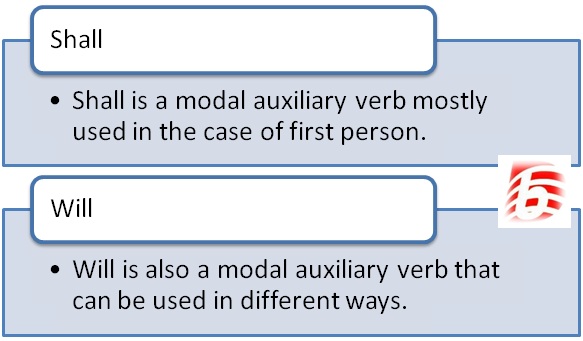Shall vs Will in English Grammar
Seeing that Shall and Will are two kinds of modal auxiliary verbs that are different from each other in terms of usage, we understand the importance of learning the difference between shall and will in English grammar. The word shall has its origin in the Old English word sceal. Shall is always used as a verb. On the contrary, will is used as a verb as well as a noun. However, similar to shall, will also has its origins in the Old English. Will has its origins in the Old English word wyllan. Let us now take a look at the difference between shall and will in English grammar.
What does Shall mean?
Shall is a modal auxiliary verb mostly used in the case of first person as in the sentences mentioned below:
I shall write to you as soon as I reach the place.
We shall meet him tomorrow.
In both the sentences given above, you can see that the auxiliary verb is used as a future auxiliary form in the case of first person singular or plural.
Shall is sometimes used expressive of suggestions, offers and requests as in the following sentences:
Shall I carry your luggage?
Shall we go out for supper?
What shall I do now?
In all the sentences given above, the modal future auxiliary verb shall is used in the case of first person as a verb expressive of an offer, suggestion and a request respectively.
What does Will mean?
Will, on the other hand, is also a modal auxiliary verb that can be used in different ways. It is common to see the use of will in predictions as in the sentence given below.
Do you think it will stop?
Sometimes, will is expressive of predictions about the present as in the following sentence.
Don’t disturb them now as they will be having dinner.
Will is sometimes used to express willingness and intention. It is usually a willingness to do something or to offer to do something as in the sentences given below:
I will help the poor boy.
I will pay the bill on his behalf.
In both the sentences, the verb will is used to express willingness to help and intention to help. Will is sometimes used to talk about the natural behavior of things as in the following sentence.
Imitation will not glitter, but real gold will.

What is the difference between Shall and Will in English Grammar?
• Shall is a modal auxiliary verb mostly used in the case of first person.
• Shall is sometimes used expressive of suggestions, offers and requests.
• Will, on the other hand, is also a modal auxiliary verb that can be used in different ways.
• It is common to see the use of will in predictions.
• Sometimes, will is expressive of predictions about the present.
• Will is sometimes used to express willingness and intention. It is usually willingness to do something or to offer to do something.
• Will is sometimes used to talk about the natural behavior of things.
ncG1vNJzZmivp6x7pbXFn5yrnZ6YsqOx07CcnqZemLyue8OinZ%2Bdopq7pLGMm5ytr5Wau26%2Fx5qjpWWRo7FuwtJmrqKknGK2r3nEp56loaOdeqi%2BwKakmqpf